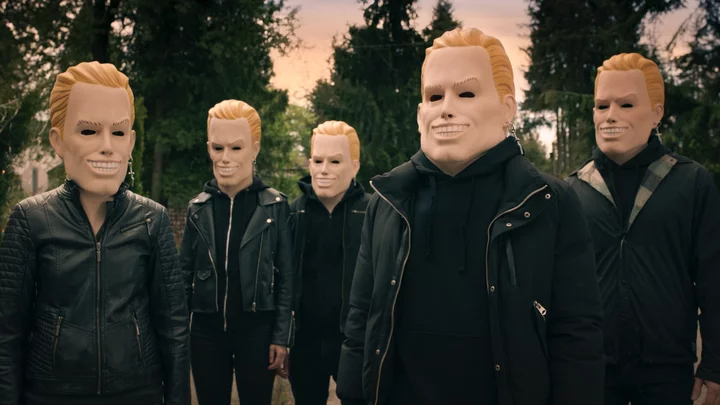On top of sending up beloved genres like slashers, '80s teen comedies, and time-travel flicks, Totally Killer also tackles a modern-day obsession: true crime.
Director Nahnatchka Khan's film introduces us to the small town of Vernon, which gained notoriety for a 1987 murder spree by the mysterious Sweet 16 Killer. Some townspeople, such as the victims' friend Pam (Julie Bowen), still feel the pain of the killer's actions. Others, like Pam's teenage daughter Jamie (Kiernan Shipka), are too young to understand the weight of the murders. Then there's podcaster Chris Dubasage (Jonathan Potts), who's devoted his life to profiting off a decades-old cold case.
SEE ALSO: 'Totally Killer' review: Fun slasher is basically an R-rated Disney Channel Original MovieChris and his focus on true crime are present right from the start of Totally Killer. He walks the audience through each of the Sweet 16 Killer's victims in a voiceover lifted straight from his podcast. Then, we cut to him leading a murder tour through Vernon, stopping at old crime scenes that are now chain restaurants. The tourists each wear a Sweet 16 Killer mask, suggesting that these murders are a phenomenon that extends far past Vernon. Now, it seems like the town has to re-live the Sweet 16 murders with every new wave of tourists, even if the interest is dwindling.
In an exciting twist, the podcast ends up helping Jamie when she time travels to 1987, right before the Sweet 16 Killer begins his reign of terror. Thanks to her knowledge of the podcast, she knows when each murder will happen, making it a weapon she can use against the original Sweet 16 Killer.
"The reason she thinks she can stop these murders is because she's so armed with the information from these podcasts," Khan told Mashable in a video interview. "She knows exactly when the killer is going to strike and where."
Jonathan Potts in "Totally Killer." Credit: Courtesy of PrimeBut beyond being a fun plot point, Chris' podcast roots Totally Killer in the conversation about true crime as entertainment. "For whatever reason, we're fascinated with these timelines of these serial killers, whether it's obscure or not," Khan told Mashable in a video interview. "Like with Serial, that was a case we didn't know about, and then we were obsessed with the details like the phone call and the cell tower. Nothing is too small."
Given true crime's current prominence, be it in podcasts, documentaries, or filmmaking, Khan knew that incorporating elements of true crime into Totally Killer would be crucial for story purposes. "It would feel real, if this had happened in this town, that somebody would be taking advantage of it in a commodifying way," said Khan.
Totally Killer takes that commodification element one step further when we learn that Chris is the present-day Sweet 16 Killer. While he had no involvement in the original murders, he realizes that the best way to keep up interest in the case is to jump start it with a new spate of deaths. He dons the spooky, smiling rubber mask of the Sweet 16 Killer, stabs Pam on Halloween, then begins to plant clues that he hopes will make his podcast a hit once more.
Chris' murders are just one example of how film and TV have been examining the ethics of the true crime genre. In its sixth season, Black Mirror explores true crime tourism and documentary-making with its "Loch Henry" episode. And both Hulu's Only Murders in the Building and the 2023 film Susie Searches feature true crime podcasters who, like Chris, end up committing crimes in order to cover them and become successful.
Totally Killer takes a lighter approach to its true crime criticism, mostly keeping it in the background until it's time for the killer reveal. But even in earlier scenes where Chris strives to keep the Sweet 16 Killer relevant in Vernon, we understand the discomfort and pain this may cause people impacted by the murders. It's an indirect indictment of his behavior — even before we know he's the murderer — but an indictment nonetheless. That's because for characters like Chris (and the podcasters-gone-rogue in Only Murders and Susie Searches), traumatizing or re-traumatizing people is totally worth it — as long as they get more listeners.









